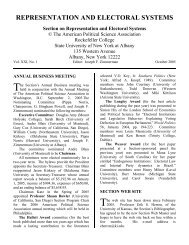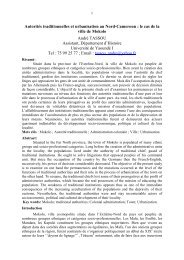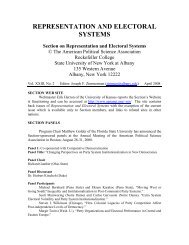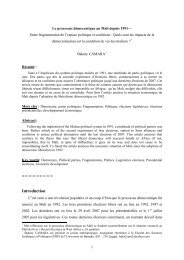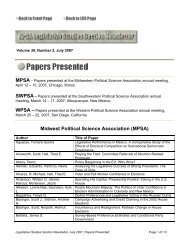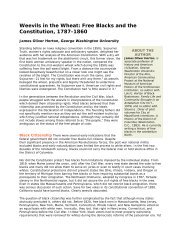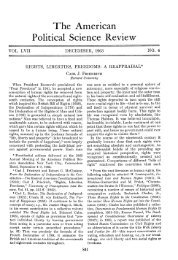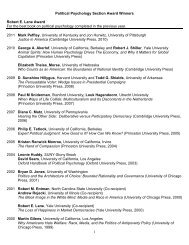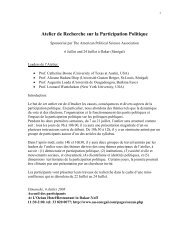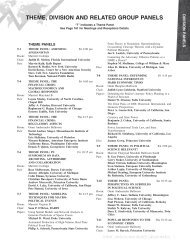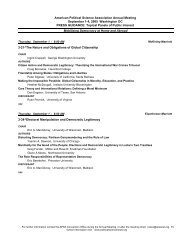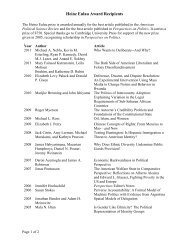representation and electoral systems - American Political Science ...
representation and electoral systems - American Political Science ...
representation and electoral systems - American Political Science ...
You also want an ePaper? Increase the reach of your titles
YUMPU automatically turns print PDFs into web optimized ePapers that Google loves.
12<br />
poorly developed security controls, incorrect system configurations, inadequate testing,<br />
<strong>and</strong> poor overall security management.<br />
State <strong>and</strong> local governments’ responses to GAO surveys regarding the 2004<br />
national elections revealed they did not always ensure that important life cycle <strong>and</strong><br />
security management practices were employed for their respective electronic voting<br />
<strong>systems</strong>. In particular, responses indicated the most current st<strong>and</strong>ards were not always<br />
adopted <strong>and</strong> applied, security management practices <strong>and</strong> controls were employed to<br />
varying degrees, <strong>and</strong> certain types of system testing were not commonly performed.<br />
Furthermore, the responses reveal the governments did not consistently monitory the<br />
performance of their <strong>systems</strong>.<br />
These problems are complicated by other conditions such as the distribution of<br />
responsibilities among various organizations <strong>and</strong> funding opportunities <strong>and</strong> constraints.<br />
Given the diffused <strong>and</strong> decentralized allocation of voting <strong>systems</strong> roles <strong>and</strong><br />
responsibilities across all levels of government, addressing these challenges will require<br />
the combined efforts of all levels of government under the leadership of the Election<br />
Assistance Commission (EAC). To assist EAC in executing its leadership role, GAO has<br />
offered recommendations aimed at better planning the ongoing <strong>and</strong> future activities<br />
relative to, for example, system st<strong>and</strong>ards <strong>and</strong> information sharing. EAC agreed with the<br />
recommendations, but reported its ability to effectively execute its role is constrained by<br />
a lack of adequate resources.<br />
MILITARY AND OVERSEAS CITIZENS VOTING<br />
The United States Government Accountability Office has published GAO-07-774,<br />
a free report entitled Elections: Action Plans Needed to Fully Address Challenges in<br />
Electronic Absentee Voting Initiatives for Military <strong>and</strong> Overseas Citizens. The<br />
Uniformed <strong>and</strong> Overseas Citizens Absentee Voting Act protects the rights of military<br />
personnel, their dependents, <strong>and</strong> overseas citizens to vote by absentee ballot.<br />
Congress in 2004 required the U.S. Department of Defense to develop an Internetbased<br />
absentee voting demonstration project <strong>and</strong> required the Election Assistance<br />
Commission, which reviews election procedures, to develop guidelines for the<br />
Department’s project. Congress in 2006 required the Department to report by May 15,<br />
2007, on plans for exp<strong>and</strong>ing its use of electronic voting technologies <strong>and</strong> required the<br />
U.S. Government Accountability Office to assess efforts by (1) by the Department to<br />
facilitate electronic absentee voting, <strong>and</strong> (2) the Commission to develop Internet voting<br />
guidelines <strong>and</strong> the Department to develop plans to exp<strong>and</strong> its use of electronic voting<br />
technologies.<br />
The Office found (1) the Department had developed several initiatives, but some<br />
exhibited weaknesses or had low participation rates that might hinder their effectiveness,<br />
(2) the Election Assistance Commission has not developed the guidelines for the<br />
Department’s use, <strong>and</strong> (3) the Department was developing, but had not completed plans<br />
for exp<strong>and</strong>ing the future use of electronic voting technologies.<br />
FAIR VOTE<br />
Fair Vote (6930 Carroll Avenue, Takoma Park, MD 20912, tel: 301-270-4616<br />
www.fairvote.org) has published four issues of its FairVote Policy Perspective in recent<br />
months: (1) “Fuzzy Math: Wrong Way Reform for Allocating Electoral College Votes”



